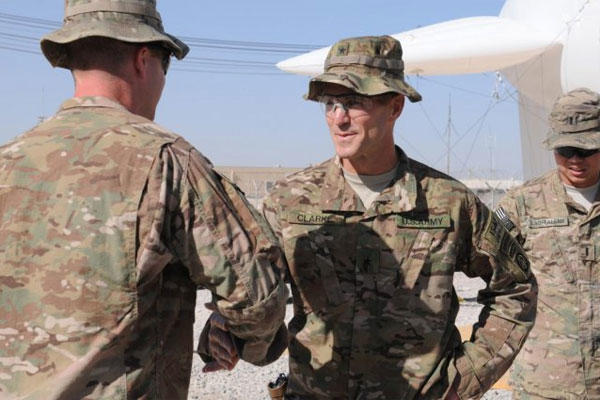The weather in Iraq has been ripe for fighting but Islamic State militants have been lying low, according to the commander of U.S. and coalition troops aiding Iraqi security forces in the country.
"For the past two days, we've had horrendous weather here," Maj. Gen. Richard Clarke told reporters on Tuesday during a briefing telecast to the Pentagon from Baghdad. "Lots of rain, lots of clouds. Usually that's an opportunity for Daesh to attack. We've seen nothing."
Clarke, who commands the 82nd Airborne Division, which has been the lead U.S. force in Iraq, said the jihadist group Islamic State in Iraq and Syria, or ISIS, also known as ISIL and Daesh, is also feeling the pressure from having less money, equipment and manpower.
Meanwhile, he said, Iraqi and Peshmerga forces -- the Kurds fighting in the northern part of the country -- have chalked up significant victories against ISIS by retaking Ramadi, Tikrit, Sinjar and Bayji.
"But in addition to taking back those key towns, what we've also seen is at least three significant attacks by Daesh, two in Haditha and one up in [the area of] Mosul in December, and [the Iraqis] held their ground," Clarke said.
In fact, since Iraqi troops retook Ramadi last May, they have not lost any further territory to ISIS, he said.
American troops pulled out of Iraq in 2010, but returned in 2014 after the Islamic State emerged in Syria and pushed into Iraq, scoring a string of victories and occupying a large swath of territory in both countries. The more than 4,000 U.S. service members in Iraq today are there principally to again train the Iraqi security forces and provide logistics, intelligence and air strike support to the Baghdad government and to the Kurd forces in the north.
Clarke said his forces have trained more than 16,000 Iraqi troops and 4,000 Peshmerga fighters.
The general, who will be leaving with the 82nd over the next few weeks and turning over the lead mission to the 101st Airborne Division, said Iraqi forces now are gearing up for the recapture of Mosul, which has been under ISIS control since June 2014.
Clarke said talks are underway with Iraqi military leadership to determine the kinds and level of support they will need to retake Mosul, one of the largest cities still held by the militants. He didn't specify when the operation might take place.
Citing operational security, Clarke would not say how many Iraqi troops are in place as part of the Mosul build-up, but noted "they have a division-level headquarters" there and are moving in some brigades, as well.
He also would not say what kind of coalition support he believed Iraq will need for the assault on Mosul, though said Ramadi serves as an example of what Iraq will need for Mosul.
"They did Ramadi with the capabilities with our airstrikes, with our ISR [intelligence, surveillance, reconnaissance], with our advice, and they didn't need it then," he said. The victory there boosted Iraq Security Forces' confidence, he said, and if they do Mosul on their own it will be a more longer lasting win for the future of Iraq.
When pressed on how the recapture of Ramadi could be a model for retaking Mosul, Clarke admitted it would be tougher.
Mosul has a population estimated to be more than 2 million, with more than 500,000 in the city itself, and its population is more diverse. Ramadi, in contrast, has about a half-million people and is largely Sunni.
Ramadi's recapture was made possible with Iraqi regular troops and Iraqi special forces, and forces already available in the surrounding area made it easier to hold the city once taken back.
Iraq may not have the numbers of special forces it would require to repeat the operation in Ramadi, nor is there the military force in the region to hold it if it did.
But Clarke said the cities are alike in terms of terrain and layout, each straddling a river and having about five or six key bridges crossing it at different points.
"Though Mosul is about five times larger than Ramadi, the model, in terms of how the Iraqi security forces plan on the eventual liberation of Mosul goes to how they plan on isolating it, how they plan on using those special forces to actually do some of the clearance, [and] how they plan on using tribal forces and police forces eventually to old the city," he said.
"No doubt, Mosul is gonna be hard," he added. "It's further away from Baghdad, where the majority of these forces will come from, and it clearly a much larger city that has many different sects that are part of it, where Ramadi is clearly and mainly a Sunni town."
-- Bryant Jordan can be reached at bryant.jordan@military.com. Follow him on Twitter at @bryantjordan.



























